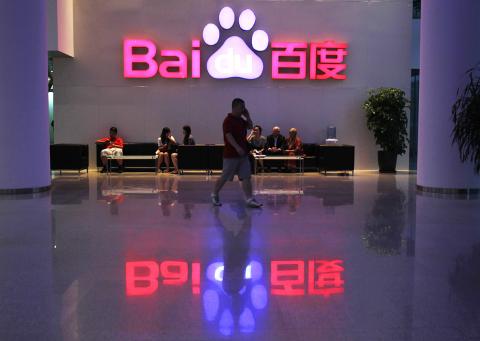Baidu Inc (百度), China’s most popular search engine, said yesterday it would distribute music from three global labels in a deal that its partners say could help clean up China’s piracy-plagued music market.
Music companies have sued Baidu twice over accusations it profited from unlicensed music copying by maintaining “deep links” on its search engine directly to sections of pirate Web sites.
The venture steps up Baidu’s rivalry with Google Inc, which closed its China search engine last year, but still operates a music download service in China, which has 485 million Internet users.

Photo: Reuters
Baidu said it would distribute music from One-Stop China (萬仕達) — a joint venture between Universal Music, Warner Music and Sony Music — and pay them for the content. The downloads are available only to computers with Internet addresses in China.
Baidu and the music companies also agreed to end outstanding litigation between them.
China is seen as a major potential market for online music and video, but legitimate suppliers have been hampered by rampant piracy.
In what the music companies see as a key part of their agreement, Baidu promised to eliminate “deep links” to pirate music sites, said Andrew Chan, One-Stop China’s chief representative.
“That means all traffic will be directed to legal links,” he said.
Chan expressed hope the commitment by such a prominent Chinese company to legal music would spur other Web sites to stop using pirated copies.
“We believe many medium and small-size companies that have infringed our music rights for a long time will think they have to change,” he said. “They will see their big brother, Baidu, is -changing to be a legal music service provider.”
In the legal settlement, Baidu agreed to donate an undisclosed sum to the anti-piracy fund of a global music industry group, the International Federation of Phonographic Industries, according to the federation’s Asia regional director, Leong May Seey.
About 500,000 songs from the music companies’ global, Mandarin and Cantonese catalogues will be made available through Baidu at the start and expect that to rise to 1 million titles as new releases are added, Chan said.
Chan said he expected One-Stop China’s digital music revenues in China to double or triple in a short period, though he had no financial details. Baidu’s music downloads will be free to users through its -advertising-supported Ting platform. However, Chan said the company also is looking at creating a pay section that will offer additional services.

To many, Tatu City on the outskirts of Nairobi looks like a success. The first city entirely built by a private company to be operational in east Africa, with about 25,000 people living and working there, it accounts for about two-thirds of all foreign investment in Kenya. Its low-tax status has attracted more than 100 businesses including Heineken, coffee brand Dormans, and the biggest call-center and cold-chain transport firms in the region. However, to some local politicians, Tatu City has looked more like a target for extortion. A parade of governors have demanded land worth millions of dollars in exchange

Hong Kong authorities ramped up sales of the local dollar as the greenback’s slide threatened the foreign-exchange peg. The Hong Kong Monetary Authority (HKMA) sold a record HK$60.5 billion (US$7.8 billion) of the city’s currency, according to an alert sent on its Bloomberg page yesterday in Asia, after it tested the upper end of its trading band. That added to the HK$56.1 billion of sales versus the greenback since Friday. The rapid intervention signals efforts from the city’s authorities to limit the local currency’s moves within its HK$7.75 to HK$7.85 per US dollar trading band. Heavy sales of the local dollar by

Taiwan Semiconductor Manufacturing Co’s (TSMC, 台積電) revenue jumped 48 percent last month, underscoring how electronics firms scrambled to acquire essential components before global tariffs took effect. The main chipmaker for Apple Inc and Nvidia Corp reported monthly sales of NT$349.6 billion (US$11.6 billion). That compares with the average analysts’ estimate for a 38 percent rise in second-quarter revenue. US President Donald Trump’s trade war is prompting economists to retool GDP forecasts worldwide, casting doubt over the outlook for everything from iPhone demand to computing and datacenter construction. However, TSMC — a barometer for global tech spending given its central role in the

The Financial Supervisory Commission (FSC) yesterday met with some of the nation’s largest insurance companies as a skyrocketing New Taiwan dollar piles pressure on their hundreds of billions of dollars in US bond investments. The commission has asked some life insurance firms, among the biggest Asian holders of US debt, to discuss how the rapidly strengthening NT dollar has impacted their operations, people familiar with the matter said. The meeting took place as the NT dollar jumped as much as 5 percent yesterday, its biggest intraday gain in more than three decades. The local currency surged as exporters rushed to